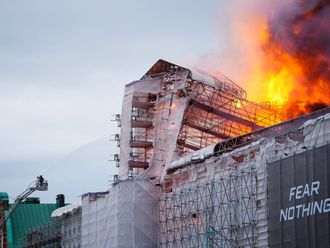RETFORD, United Kingdom: Britain’s local elections on Thursday are a street-by-street fight for advantage in the battleground areas where next month’s national vote will be won and lost.
Victory in the places that swing between Prime Minister Theresa May’s Conservatives and the opposition Labour Party could prove crucial in gaining momentum ahead of the June 8 general elections.
Both May and Labour leader Jeremy Corbyn chose Nottinghamshire in central England to launch their campaigns, as winning control of the county council here would be a symbolic scalp.
And Nottinghamshire, balanced between the more conservative farming east and Labour strongholds in the west’s former coalfields, could show the way the political wind is blowing.
Both parliamentary seats in the historic Nottinghamshire market town of Retford, population 20,000, went from Labour to the Conservatives in 2009 and back again in 2013, when Labour took a one-seat majority on the county council.
“I expect not to have an easy run and it can go two ways,” said Pam Skelding, who is defending the seat in the east of the town, which was a staging post on the historic Great North Road coaching route from London to Edinburgh.
“You could go door-knocking in one area and think things are looking really good and then go to another and think it’s really bad.”
Nearly 5,000 local authority seats are being contested across Britain on Thursday, while six new mayoralties are also up for grabs.
Nationally, opinion polls show Labour trailing more than 20 points behind the Conservatives, but Corbyn insists his party can win.
Each of Thursday’s races will be fought on different local issues, and experts caution against using the results to predict the general election outcome as most metropolitan areas are not being disputed.
John Hess, an honorary politics professor at Nottingham University, said Labour would worry for June 8 if their vote share plunged on Thursday.
“May is targeting what would normally be regarded as Labour heartlands,” he told AFP.
“Whatever is happening to Labour, that story will be told in Nottinghamshire.”
May stunned the British political establishment by calling a snap vote last month, saying she wanted a stronger mandate as she heads into negotiations on taking Britain out of the European Union.
It means that for the first time, the local elections are taking place in the middle of a general election campaign.
“Normally the local elections go against the sitting government but the feeling on the doorstep is not like a normal year,” said the Conservatives’ Retford West candidate, Mike Quigley.
In Carolgate, Retford’s pedestrianised main shopping street that runs up to the market square with its French-style 19th-century town hall, national issues are on the minds of many voters.
“I hope Theresa May does get a stronger hand in parliament because it will help with the Brexit talks,” said John Townsend, 64, a retired business analyst.
But Quigley’s Labour opponent Darrell Pulk, who is campaigning on local issues, told AFP the race was tight.
“The Conservatives nationally think they’re fighting the election on Brexit but I’ve got a sneaky feeling the public won’t see it like that,” he said.
Analysis by experts Colin Rallings and Michael Thrasher, professors at Plymouth University’s elections centre, suggests May’s party will make substantial gains on Thursday.
But they and other experts stress that the context of Thursday’s election will vary in Scotland, Wales and England — where the local council votes are mostly in rural areas.
Meanwhile six urban areas will be electing mayors for the first time, including Manchester, Liverpool, Bristol and the West Midlands, centred on Birmingham.
Labour former health minister Andy Burnham is expected to win in Manchester, while the Conservatives hope Andy Street, who ran the upmarket department store chain John Lewis, can win in the West Midlands.












